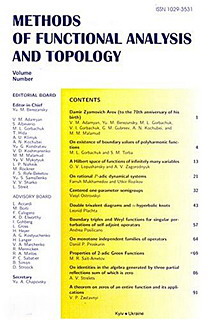S. M. Zagorodnyuk
Search this author in Google Scholar
The two-dimensional moment problem in a strip
MFAT 19 (2013), no. 1, 40-54
40-54
In this paper we study the two-dimensional moment problem in a strip $\Pi(R) = \{ (x_1,x_2)\in \mathbb{R}^2:\ |x_2| \leq R \}$, $R>0$. We obtained an analytic parametrization of all solutions of this moment problem. Usually the problem is reduced to an extension problem for a pair of commuting symmetric operators but we have no possibility to construct such extensions in larger spaces in a direct way. It turns out that we can find solutions without knowing the corresponding extensions in larger spaces. We used the fundamental results of Shtraus on generalized resolvents and some results from the measure theory.
The Nevanlinna-type formula for the matrix Hamburger moment problem
MFAT 18 (2012), no. 4, 387-400
387-400
In this paper we obtain a Nevanlinna-type formula for the matrix Hamburger moment problem. We only assume that the problem is solvable and has more than one solution. We express the matrix coefficients of the corresponding linear fractional transformation in terms of the prescribed moments. Necessary and sufficient conditions for the determinacy of the moment problem in terms of the given moments are obtained.
On commuting symmetric operators
MFAT 18 (2012), no. 2, 198-200
198-200
In this paper we present some conditions for a pair of commuting symmetric operators with a joint invariant dense domain in a Hilbert space, to have a commuting self-adjoint extension in the same space. The remarkable Godic-Lucenko theorem allows to get a convenient description of all such extensions.
A description of all solutions of the matrix Hamburger moment problem in a general case
MFAT 16 (2010), no. 3, 271-288
271-288
We describe all solutions of the matrix Hamburger moment problem in a general case (no conditions besides solvability are assumed). We use the fundamental results of A. V. Shtraus on the generalized resolvents of symmetric operators. All solutions of the truncated matrix Hamburger moment problem with an odd number of given moments are described in an "almost nondegenerate" case. Some conditions of solvability for the scalar truncated Hamburger moment problem with an even number of given moments are given.
Positive definite kernels satisfying difference equations
MFAT 16 (2010), no. 1, 83-100
83-100
We study positive definite kernels $K = (K_{n,m})_{n,m\in A}$, $A=\mathbb Z$ or $A=\mathbb Z_+$, which satisfy a difference equation of the form $L_n K = \overline L_m K$, or of the form $L_n \overline L_m K = K$, where $L$ is a linear difference operator (here the subscript $n$ ($m$) means that $L$ acts on columns (respectively rows) of $K$). In the first case, we give new proofs of Yu.M. Berezansky results about integral representations for $K$. In the second case, we obtain integral representations for $K$. The latter result is applied to strengthen one our result on abstract stochastic sequences. As an example, we consider the Hamburger moment problem and the corresponding positive matrix of moments. Classical results on the Hamburger moment problem are derived using an operator approach, without use of Jacobi matrices or orthogonal polynomials.
Integral representations for spectral functions of some nonself-adjoint Jacobi matrices
MFAT 15 (2009), no. 1, 91-100
91-100
We study a Jacobi matrix $J$ with complex numbers $a_n,\ n\in\mathbb Z_+,$ in the main diagonal such that $r_0 \leq {\rm Im}\, a_n \leq r_1,\ r_0,r_1\in\mathbb R$. We obtain an integral representation for the (generalized) spectral function of the matrix $J$. The method of our study is similar to Marchenko's method for nonself-adjoint differential operators.
The direct and inverse spectral problems for (2N+1)-diagonal complex transposition-antisymmetric matrices
MFAT 14 (2008), no. 2, 124-131
124-131
We consider a difference equation associated with a semi-infinite complex $(2N+1)$-diagonal transposition-antisymmetric matrix $J=(g_{k,l})_{k,l=0}^\infty$ with $g_{k,k+N} \not=0$, $k=0,1,2,\ldots ,$ ($g_{k,l}=-g_{l,k}$): $\sum_{j=-N}^N g_{k,k+j} y_{k+j} = \lambda^N y_k,\ k=0,1,2,\ldots ,$ where $y=(y_0,y_1,y_2,\ldots )$ is an unknown vector, $\lambda$ is a complex parameter, $g_{k,l}$ and $y_l$ with negative indices are equal to zero, $N\in\mathbb N$. We introduce a notion of the spectral function for this difference equation. We state and solve the direct and inverse problems for this equation.

